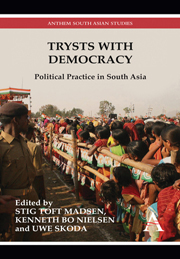Book contents
- Frontmatter
- Contents
- List of Tables
- List of Abbreviations
- Glossary
- Map of South Asia
- Acknowledgements
- 1 Introduction
- Part One Theoretical Issues
- Part Two India
- Part Three Beyond India
- 8 Nepal: Governance and Democracy in a Frail State
- 9 Entanglements of Politics and Education in Sri Lanka
- 10 Shifting between the Local and Transnational: Space, Power and Politics in War-torn Sri Lanka
- 11 Domestic Roots of Indian Foreign Policy
- 12 When Democracy is Not the Only Game in Town: Sectarian Conflicts in Pakistan
- About the Editors
- About the Contributors
8 - Nepal: Governance and Democracy in a Frail State
from Part Three - Beyond India
Published online by Cambridge University Press: 05 March 2012
- Frontmatter
- Contents
- List of Tables
- List of Abbreviations
- Glossary
- Map of South Asia
- Acknowledgements
- 1 Introduction
- Part One Theoretical Issues
- Part Two India
- Part Three Beyond India
- 8 Nepal: Governance and Democracy in a Frail State
- 9 Entanglements of Politics and Education in Sri Lanka
- 10 Shifting between the Local and Transnational: Space, Power and Politics in War-torn Sri Lanka
- 11 Domestic Roots of Indian Foreign Policy
- 12 When Democracy is Not the Only Game in Town: Sectarian Conflicts in Pakistan
- About the Editors
- About the Contributors
Summary
Nepal is a challenge for political scientists. Is it more a case of a failed state in need of fundamental restructuring or merely of a state that is failing to deliver, but that can be brought back to a more effective and efficient condition? The difference is more than a question of semantics. The former could lead to secession and the break-up of the state of Nepal in the face of regional and ethnic communities demanding greater autonomy and the right to selfdetermination. In this scenario it is the politics of identity that will continue to dominate and drive the agenda. The latter might see the current frustrations with the present state lead to its reorganisation, possibly to a federal rather than a unitary form; but it operates with a belief that the conditions for an effective and efficient state remain. This would suggest that the more fundamental challenge lies in the reform of governance and in making it more representative of the diversity of Nepal's citizens.
The challenge in analysing and understanding Nepal is that indicators pointing to both possibilities are present in the post-conflict scenario in which peace has yet to be secured. The state's security forces lack effective control in many areas, there is a strongly voiced demand for autonomous provinces based on ethnicity, there is a strong and growing opposition to the rule of law by politicians and political parties' organisations, the army has openly contested rule by civilian government, and the drafting of a new constitution is so contested that the constituent assembly has been extended for a further year until the end of May 2011.
- Type
- Chapter
- Information
- Trysts with DemocracyPolitical Practice in South Asia, pp. 195 - 214Publisher: Anthem PressPrint publication year: 2011

